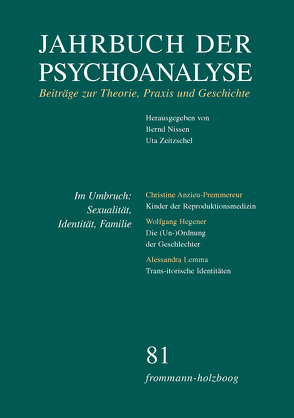
Wolfgang Hegener: Die (Un-)Ordnung der Geschlechter im Zeitalter ihrer technologischen Reproduzierbarkeit
Christine Anzieu-Premmereur: Kinder der Reproduktionsmedizin und ihre Eltern
Marganit Ofer: Multifokal – Neue Familienstrukturen im Lichte psychoanalytischer Theorie
Alessandra Lemma: Trans-itorische Identitäten – Einige psychoanalytische Überlegungen zu Transgender-Identitäten
Lisa Schmuckli und Patrick Gross: Ein Geschlecht – Widersprüchliche Geschlechterfindung
Sabine Warneke: Der transsexuelle Wunsch, in sich herzustellen, was einem genommen wurde
Freud als Briefschreiber:
Ludger M. Hermanns / Peter J. Loewenberg: »Wer von der Wissenschaft gemütliche Befriedigung fordert oder erwartet, der muß sich enttäuscht fühlen«. Ein Brief Freuds an den Schriftsteller Oscar A. H. Schmitz aus dem Jahre 1921
Wolfgang-Loch-Vorlesung:
Aleida Assmann: Räumliche und zeitliche Bilder des Erinnerns und Vergessens
Udo Hock: Das Vergessen und seine Beziehung zum Unbewussten
Nachruf:
Friedrich-Wilhelm Eickhoff: Nachruf auf Professor Léon Wurmser
Aktualisiert: 2020-11-06
Autor:
Jorge L. Ahumada,
Tatjana Aladvidze,
Christine Anzieu-Premmereur,
Aleida Assmann,
Hermann Beland,
Wolfgang Berner,
Giuseppe Civitarese,
Angelika Ebrecht-Laermann,
Friedrich-Wilhelm Eickhoff,
Henrik Enckell,
Terttu Eskelinen de Folch,
Claudia Frank,
Lilli Gast,
Patrick Gross,
Ilse Grubrich-Simitis,
Wolfgang Hegener,
Ludger M. Hermanns,
Helmut Hinz,
Udo Hock,
Albrecht Kuchenbuch,
Egle Laufer,
Alessandra Lemma,
Howard B. Levine,
Elfriede Löchel,
Peter J. Loewenberg,
Patrick Miller,
Carine Minne,
Bernd Nissen,
Marganit Ofer,
Ursula Ostendorf,
Johannes Picht,
Lisa Schmuckli,
Gerhard Schneider,
Claudia Thußbas,
Sabine Warneke,
Peter Wegner,
Rob Wille,
Leon Wurmser,
Uta Zeitzschel
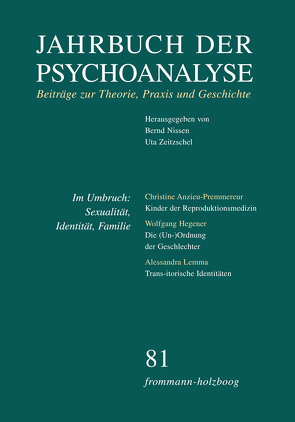
Wolfgang Hegener: Die (Un-)Ordnung der Geschlechter im Zeitalter ihrer technologischen Reproduzierbarkeit
Christine Anzieu-Premmereur: Kinder der Reproduktionsmedizin und ihre Eltern
Marganit Ofer: Multifokal – Neue Familienstrukturen im Lichte psychoanalytischer Theorie
Alessandra Lemma: Trans-itorische Identitäten – Einige psychoanalytische Überlegungen zu Transgender-Identitäten
Lisa Schmuckli und Patrick Gross: Ein Geschlecht – Widersprüchliche Geschlechterfindung
Sabine Warneke: Der transsexuelle Wunsch, in sich herzustellen, was einem genommen wurde
Freud als Briefschreiber:
Ludger M. Hermanns / Peter J. Loewenberg: »Wer von der Wissenschaft gemütliche Befriedigung fordert oder erwartet, der muß sich enttäuscht fühlen«. Ein Brief Freuds an den Schriftsteller Oscar A. H. Schmitz aus dem Jahre 1921
Wolfgang-Loch-Vorlesung:
Aleida Assmann: Räumliche und zeitliche Bilder des Erinnerns und Vergessens
Udo Hock: Das Vergessen und seine Beziehung zum Unbewussten
Nachruf:
Friedrich-Wilhelm Eickhoff: Nachruf auf Professor Léon Wurmser
Aktualisiert: 2020-11-10
Autor:
Jorge L. Ahumada,
Tatjana Aladvidze,
Christine Anzieu-Premmereur,
Aleida Assmann,
Hermann Beland,
Wolfgang Berner,
Giuseppe Civitarese,
Angelika Ebrecht-Laermann,
Friedrich-Wilhelm Eickhoff,
Henrik Enckell,
Terttu Eskelinen de Folch,
Claudia Frank,
Lilli Gast,
Patrick Gross,
Ilse Grubrich-Simitis,
Wolfgang Hegener,
Ludger M. Hermanns,
Helmut Hinz,
Udo Hock,
Albrecht Kuchenbuch,
Egle Laufer,
Alessandra Lemma,
Howard B. Levine,
Elfriede Löchel,
Peter J. Loewenberg,
Patrick Miller,
Carine Minne,
Bernd Nissen,
Marganit Ofer,
Ursula Ostendorf,
Johannes Picht,
Lisa Schmuckli,
Gerhard Schneider,
Claudia Thußbas,
Sabine Warneke,
Peter Wegner,
Rob Wille,
Leon Wurmser,
Uta Zeitzschel
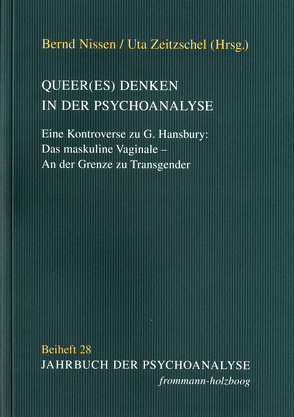
Hat die Psychoanalyse neue Entwicklungen verschlafen? Hilft queer(es) Denken, die Psychoanalyse wachzurütteln? Griffin Hansburys Arbeit »Das maskuline Vaginale und seine Verkörperung bei queeren Männern an der Grenze zu Transgender« provoziert sowohl behandlungstechnisch wie auch klinisch-theoretisch. Begegnet er seinem Patienten unvoreingenommen frisch in den Sitzungen oder missachtet er Grenzen? Gelingt ihm ein neuer Blick auf psychogenetische und theoretische Dimensionen oder folgt er auf Kosten des Patienten einer überwertigen Idee? Das Beiheft des ›Jahrbuchs der Psychoanalyse‹ hat Dana Amir, Leticia Glocer Fiorini, Howard B. Levine, Franco De Masi und Bernd Nissen um Kommentare gefragt, die sich pointiert mit Hansburys Arbeit auseinandersetzen.
Aktualisiert: 2023-03-14
Autor:
Jorge Ahumada,
Tatjana Alavidze,
Dana Amir,
Hermann Beland,
Wolfgang Berner,
Giuseppe Civitarese,
Franco De Masi,
Friedrich-Wilhelm Eickhoff,
Angelika Elbrecht-Laermann,
Henrik Enckell,
Terttu Eskelinen de Folch,
Claudia Frank,
Lilli Gast,
Leticia Glocer Fiorini,
Ilse Grubrich-Simitis,
Griffin Hansbury,
Ludger M. Hermanns,
Helmut Hinz,
Albrecht Kuchenbuch,
Egle Laufer,
Howard B. Levine,
Elfriede Löchel,
Patrick Miller,
Carine Minne,
Bernd Nissen,
Ursula Ostendorf,
Johannes Picht,
Gerhard Schneider,
Claudia Thußbas,
Peter Wegner,
Rob Wille,
Leon Wurmser,
Uta Zeitzschel
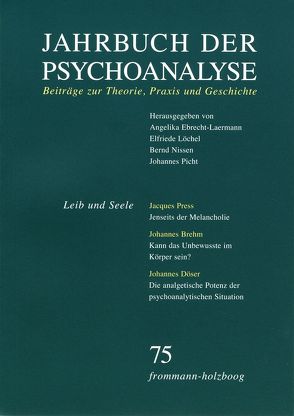
Rolf Kühn: Die Frage nach der therapeutischen Grunderfahrung. Ein lebensphänomenologischer Dialog mit Freud und Lacan
The Question of the Basic Experience of Psychotherapy – Phenomenology of Life in Dialogue with Freud and Lacan. The question of which phenomenology corresponds best to psychoanalysis and depth psychology has been discussed in France since Sartre. Here, it is examined with special reference to Lacan and Henry, two authors representing two radical positions: on one hand the chain of significants of alterity, leaving basically no room for subjectivity; on the other hand the notion of a purely phenomenological life in which subjectivity is founded originally in the living body. The examination draws on Freud who, by describing a distinct phenomenality of affect and instinct (Trieb) independent of phantasy, already knew an autonomous phenomenality of the body which he linked to the unconscious. With regard to therapeutic practice, a bridging is undertaken between these two approaches, and it is shown that the basic therapeutic experience implies a unity of desire and sense (Sinn) in which elements of existential analysis may be integrated in order to do justice to the overall requirement of patients in an increasingly heterogeneous social environment.
Udo Hock: Unbewusstes und Sein. Zum Verhältnis von Lebensphänomenologie und Psychoanalyse – Eine Antwort auf Rolf Kühn
Unconscious and Being: The Relationship between Phenomenology of Life and Psychoanalysis – A Reply to Rolf Kühn. In part one of this commentary Rolf Kühn‹s essay »Inquiring into the fundamentals of therapeutic experience« is placed in the wider context of philosophy and psychoanalysis. ›Daseinsanalyse‹ and ›Critical Theory‹ in Germany, the triad of structuralism, poststructuralism and deconstructivism in France are designated as the most important currents of human sciences which influenced and have been influenced by psychoanalysis. In the second part Kühn‹s »radicalised phenomenology of life« is analysed focusing on its main concepts (›corporeality‹, ›affectability‹, ›passibility‹). Their reference on Freud and Lacan is traced. In the last part some of Kühn‹s central positions are criticised and confronted with Lacan‹s and Laplanche‹s views on the unconscious.
Jacques Press: Jenseits der Melancholie: Von ›Trauer und Melancholie‹ zu ›Die Angst vor dem Zusammenbruch‹
Beyond Melancholia – From »Mourning and Melancholia« to »Fear of Breakdown«. The reflections given here derive from two sources: the author‹s clinical experience of oscillations between movements of melancholy and movements of breakdown; and his theoretical view on breakdown as a central psychosomatic crossing point. »Mourning and Melancholy« (Freud 1917e) and »Fear of Breakdown« (Winnicott 1991 [1974]) are submitted to comparative analysis, leading to the hypothesis that melancholy constitutes one of the most tenacious defences against an experience of breakdown. The clinical consequence the author sees from here is the task in each case to advance from the melancholy defense to the underlying breakdown.
Hanno Heymanns: Eine Winterreise: Zur psychoanalytischen Psychotherapie einer Hochbetagten zwischen Depression, physischer Gebrechlichkeit und beginnender Demenz
›Winterreise‹ – The Psychoanalytic Psychotherapy of an Aged Patient between Depression, Physical and Psychic Frailty, and Beginning Dementia. Using a case presentation, which centers on the theme of separation and on the process of transference/countertransference, the differential diagnosis of and psychodynamics between physical frailty, early dementia and depression are elaborated, and in this respect the interconnection of body and mind is discussed from a specific psychoanalytical perspective. The clinical material illustrates that the long prevailing deficit and defect model – especially of advanced age – currently has been replaced by a more dynamic point of view. It also proves Bion‹s statement regarding the onset of senility to which he attributes emotional turbulences as at adolescence. The concept of the contact-barrier, which was introduced by Freud and further elaborated by Bion, proves to be helpful to render the rearrangement of psychomental functioning in old age more comprehensible. In reverse perspective it is also reflected how the psychoanalyst‹s advanced age can impair and affect his/her mental functioning as an analyst.
Johannes Brehm: Kann das Unbewusste im Körper sein? Zum analytischen Umgang mit protomentalisierten Zuständen – eine Kasuistik
Can the Unconscious Be in the Body? The Psychoanalytic Handling of Protomentalized States – A Case Study. In primitive psychosomatic states emotional experiences are not as yet represented symbolically. Instead, they are experienced as states of excitement on a body-mind level, which can only be transformed within object relationships capable of resonance. This paper describes the first eighteen months of analytic treatment of a female patient with various psychosomatic symptoms in order to illustrate the processes of transformation of hitherto unrepresented states of psychosomatic excitement, which initially need to be enacted and realized within the transference. The analytic attitude required for this and the mental conceptualizations are pointed out in the presentation of the clinical material and in subsequent reflection. The paper concludes by elaborating some central aspects of our expanded knowledge of the significance of unrepresented states of excitement in the early processes of exchange between the infant and its primary objects – as they present themselves with regard to questions of technique in the treatment of our patients.
Johannes Döser: Die analgetische Potenz der psychoanalytischen Situation
The Analgesic Effect of the Psychoanalytical Situation. While the painfulness of the psychoanalytic process is frequently discussed, the analgesic effect of the psychoanalytic situation has so far received little attention. Based on metapsychology and the etiology of physical and mental pain, this paper examines the efforts of the traumatized subject to find regenerative pathways that allow linking up with pretraumatic integrity and help to cope with physical and narcissistic injury. Due to its stimulating effect on phantasy and dream activity, the analytic situation is associated with a significant psychoprosthetic function which limits destructive pain and counteracts the development of chronic pain. Findings from phantom pain- and placeboresearch can provide useful hints for psychoanalysts in the treatment of patients with persistent pain disorders.
Buchessay:
Uta Zeitzschel: Riccardo Lombardis ›Formless Infinity‹: Der Körper als Kompass
Riccardo Lombardis Formless Infinity – The Body as a Compass. Riccardo Lombardis book Formless Infinity (2016) is presented. Lombardi discusses the concepts of the unconscious, the role of the body in analysis, the reverie of the analyst, time, and death. He presents numerous clinical examples of working with psychotic patients and conceptualises his work based on theories of Bion and Matte-Blanco. Using a short case vignette, the author concludes with observations regarding the role of the body in analytic treatment.
Wolfgang-Loch-Vorlesung:
Joachim Küchenhoff / Rolf-Peter Warsitz: Von der Eigenständigkeit psychoanalytischer Erfahrung
On the Originality of Psychoanalytic Experience. Psychoanalysis has often been criticized to lack an epistemological basis. In this paper we answer this critique by outlining what we call a »dialectical epistemology of psychoanalysis«. In part 1, the impasses in the controversial discussions concerning the epistemological status of psychoanalysis up to now are highlighted. In part 2, we focus on the philosophical foundations of the dialectical concept we propose. We argue for an enlarged concept of language, its foundation in semiotics and its central role for psychoanalytic epistemology. We show that any anthropology or hermeneutics that might serve as a basis for psychoanalysis must consider and integrate negativity, due to the psychoanalytic notion of the unconscious implying different kinds of negative experience. Part 3 describes the dialectical model with respect to basic tools of psychoanalytic perception: The fundamental rules of psychoanalytic practice are extended by the notions of reverie and prosody, allowing integration into a psychoanalytic use of semiotic principles. Part 4 summarizes the central arguments.
Aktualisiert: 2020-01-01
Autor:
Hermann Beland,
Wolfgang Berner,
Johannes Brehm,
Johannes Döser,
Angelika Ebrecht-Laermann,
Friedrich-Wilhelm Eickhoff,
Terttu Eskelinen de Folch,
Claudia Frank,
Lilli Gast,
Ilse Grubrich-Simitis,
Ludger M. Hermanns,
Hanno Heymanns,
Helmut Hinz,
Udo Hock,
Albrecht Kuchenbuch,
Joachim Küchenhoff,
Rolf Kühn,
M. Egle Laufer,
Elfriede Löchel,
Bernd Nissen,
Johannes Picht,
Jaques Press,
Gerhard Schneider,
Rolf-Peter Warsitz,
Leon Wurmser,
Uta Zeitzschel
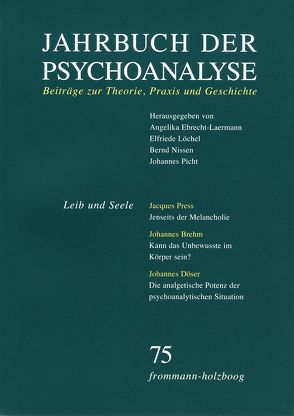
Rolf Kühn: Die Frage nach der therapeutischen Grunderfahrung. Ein lebensphänomenologischer Dialog mit Freud und Lacan
The Question of the Basic Experience of Psychotherapy – Phenomenology of Life in Dialogue with Freud and Lacan. The question of which phenomenology corresponds best to psychoanalysis and depth psychology has been discussed in France since Sartre. Here, it is examined with special reference to Lacan and Henry, two authors representing two radical positions: on one hand the chain of significants of alterity, leaving basically no room for subjectivity; on the other hand the notion of a purely phenomenological life in which subjectivity is founded originally in the living body. The examination draws on Freud who, by describing a distinct phenomenality of affect and instinct (Trieb) independent of phantasy, already knew an autonomous phenomenality of the body which he linked to the unconscious. With regard to therapeutic practice, a bridging is undertaken between these two approaches, and it is shown that the basic therapeutic experience implies a unity of desire and sense (Sinn) in which elements of existential analysis may be integrated in order to do justice to the overall requirement of patients in an increasingly heterogeneous social environment.
Udo Hock: Unbewusstes und Sein. Zum Verhältnis von Lebensphänomenologie und Psychoanalyse – Eine Antwort auf Rolf Kühn
Unconscious and Being: The Relationship between Phenomenology of Life and Psychoanalysis – A Reply to Rolf Kühn. In part one of this commentary Rolf Kühn‹s essay »Inquiring into the fundamentals of therapeutic experience« is placed in the wider context of philosophy and psychoanalysis. ›Daseinsanalyse‹ and ›Critical Theory‹ in Germany, the triad of structuralism, poststructuralism and deconstructivism in France are designated as the most important currents of human sciences which influenced and have been influenced by psychoanalysis. In the second part Kühn‹s »radicalised phenomenology of life« is analysed focusing on its main concepts (›corporeality‹, ›affectability‹, ›passibility‹). Their reference on Freud and Lacan is traced. In the last part some of Kühn‹s central positions are criticised and confronted with Lacan‹s and Laplanche‹s views on the unconscious.
Jacques Press: Jenseits der Melancholie: Von ›Trauer und Melancholie‹ zu ›Die Angst vor dem Zusammenbruch‹
Beyond Melancholia – From »Mourning and Melancholia« to »Fear of Breakdown«. The reflections given here derive from two sources: the author‹s clinical experience of oscillations between movements of melancholy and movements of breakdown; and his theoretical view on breakdown as a central psychosomatic crossing point. »Mourning and Melancholy« (Freud 1917e) and »Fear of Breakdown« (Winnicott 1991 [1974]) are submitted to comparative analysis, leading to the hypothesis that melancholy constitutes one of the most tenacious defences against an experience of breakdown. The clinical consequence the author sees from here is the task in each case to advance from the melancholy defense to the underlying breakdown.
Hanno Heymanns: Eine Winterreise: Zur psychoanalytischen Psychotherapie einer Hochbetagten zwischen Depression, physischer Gebrechlichkeit und beginnender Demenz
›Winterreise‹ – The Psychoanalytic Psychotherapy of an Aged Patient between Depression, Physical and Psychic Frailty, and Beginning Dementia. Using a case presentation, which centers on the theme of separation and on the process of transference/countertransference, the differential diagnosis of and psychodynamics between physical frailty, early dementia and depression are elaborated, and in this respect the interconnection of body and mind is discussed from a specific psychoanalytical perspective. The clinical material illustrates that the long prevailing deficit and defect model – especially of advanced age – currently has been replaced by a more dynamic point of view. It also proves Bion‹s statement regarding the onset of senility to which he attributes emotional turbulences as at adolescence. The concept of the contact-barrier, which was introduced by Freud and further elaborated by Bion, proves to be helpful to render the rearrangement of psychomental functioning in old age more comprehensible. In reverse perspective it is also reflected how the psychoanalyst‹s advanced age can impair and affect his/her mental functioning as an analyst.
Johannes Brehm: Kann das Unbewusste im Körper sein? Zum analytischen Umgang mit protomentalisierten Zuständen – eine Kasuistik
Can the Unconscious Be in the Body? The Psychoanalytic Handling of Protomentalized States – A Case Study. In primitive psychosomatic states emotional experiences are not as yet represented symbolically. Instead, they are experienced as states of excitement on a body-mind level, which can only be transformed within object relationships capable of resonance. This paper describes the first eighteen months of analytic treatment of a female patient with various psychosomatic symptoms in order to illustrate the processes of transformation of hitherto unrepresented states of psychosomatic excitement, which initially need to be enacted and realized within the transference. The analytic attitude required for this and the mental conceptualizations are pointed out in the presentation of the clinical material and in subsequent reflection. The paper concludes by elaborating some central aspects of our expanded knowledge of the significance of unrepresented states of excitement in the early processes of exchange between the infant and its primary objects – as they present themselves with regard to questions of technique in the treatment of our patients.
Johannes Döser: Die analgetische Potenz der psychoanalytischen Situation
The Analgesic Effect of the Psychoanalytical Situation. While the painfulness of the psychoanalytic process is frequently discussed, the analgesic effect of the psychoanalytic situation has so far received little attention. Based on metapsychology and the etiology of physical and mental pain, this paper examines the efforts of the traumatized subject to find regenerative pathways that allow linking up with pretraumatic integrity and help to cope with physical and narcissistic injury. Due to its stimulating effect on phantasy and dream activity, the analytic situation is associated with a significant psychoprosthetic function which limits destructive pain and counteracts the development of chronic pain. Findings from phantom pain- and placeboresearch can provide useful hints for psychoanalysts in the treatment of patients with persistent pain disorders.
Buchessay:
Uta Zeitzschel: Riccardo Lombardis ›Formless Infinity‹: Der Körper als Kompass
Riccardo Lombardis Formless Infinity – The Body as a Compass. Riccardo Lombardis book Formless Infinity (2016) is presented. Lombardi discusses the concepts of the unconscious, the role of the body in analysis, the reverie of the analyst, time, and death. He presents numerous clinical examples of working with psychotic patients and conceptualises his work based on theories of Bion and Matte-Blanco. Using a short case vignette, the author concludes with observations regarding the role of the body in analytic treatment.
Wolfgang-Loch-Vorlesung:
Joachim Küchenhoff / Rolf-Peter Warsitz: Von der Eigenständigkeit psychoanalytischer Erfahrung
On the Originality of Psychoanalytic Experience. Psychoanalysis has often been criticized to lack an epistemological basis. In this paper we answer this critique by outlining what we call a »dialectical epistemology of psychoanalysis«. In part 1, the impasses in the controversial discussions concerning the epistemological status of psychoanalysis up to now are highlighted. In part 2, we focus on the philosophical foundations of the dialectical concept we propose. We argue for an enlarged concept of language, its foundation in semiotics and its central role for psychoanalytic epistemology. We show that any anthropology or hermeneutics that might serve as a basis for psychoanalysis must consider and integrate negativity, due to the psychoanalytic notion of the unconscious implying different kinds of negative experience. Part 3 describes the dialectical model with respect to basic tools of psychoanalytic perception: The fundamental rules of psychoanalytic practice are extended by the notions of reverie and prosody, allowing integration into a psychoanalytic use of semiotic principles. Part 4 summarizes the central arguments.
Aktualisiert: 2019-10-08
Autor:
Hermann Beland,
Wolfgang Berner,
Johannes Brehm,
Johannes Döser,
Angelika Ebrecht-Laermann,
Friedrich-Wilhelm Eickhoff,
Terttu Eskelinen de Folch,
Claudia Frank,
Lilli Gast,
Ilse Grubrich-Simitis,
Ludger M. Hermanns,
Hanno Heymanns,
Helmut Hinz,
Udo Hock,
Albrecht Kuchenbuch,
Joachim Küchenhoff,
Rolf Kühn,
M. Egle Laufer,
Elfriede Löchel,
Bernd Nissen,
Johannes Picht,
Jaques Press,
Gerhard Schneider,
Rolf-Peter Warsitz,
Leon Wurmser,
Uta Zeitzschel

Inhalt: Anna Tuschling: Das Diskrete in der Psychoanalyse. Grenzgänge zwischen Metapsychologie und Medienforschung – Rotraut De Clerck: Die Macht der Bilder? Zur Bedeutung von Internetpornographie: Sucht, Perversion oder (männliche) Hysterie? Ein Fallbericht – Florence Guignard: Virtuelle Realität und die Prinzipien psychischer Prozesse. Über Psychoanalyse und Kinder in der heutigen westlichen Gesellschaft – Klinik der Psychoanalyse: Horst-Eberhard Richter: Die narzißtischen Projektionen der Eltern auf das Kind – Reprint des Aufsatzes aus dem Jahrbuch der Psychoanalyse Band 1, 1960 – Horst-Eberhard Richter: Nachgedanken zum Aufsatz 'Die narzißtischen Projektionen der Eltern auf das Kind' – Veronica Mächtlinger: Der Beitrag des Kindes zur eigenen psychischen Entwicklung. Kommentar zu H.-E. Richters 'Die narzißtischen Projektionen der Eltern auf das Kind' – Terttu Eskelinen de Folch und Pere Folch: Über narzißtische innere Objektbeziehungen und wie sie agiert werden – Kommentar zu H.-E. Richters 'Die narzißtischen Projektionen der Eltern auf das Kind' – Essay: Gesine Bey: Geheimnisse, die 'wie große Katzen' durch die Menschen laufen. Die Schriftstellerin und Ärztin Angela Rohr – Zeitzeugin des 20. Jahrhunderts und der Psychoanalyse – Freud als Briefschreiber: Gerhard Fichtner: 'Sie wissen, welches Maß von Anerkennung man verträgt…' – Ein Brief Freuds an Alexandre Hérenger aus dem Jahre 1930.
Aktualisiert: 2019-12-20
Autor:
Gesine Bey,
Rotraut De Clerck,
Gerhard Fichtner,
Pere Folch,
Terttu Eskelinen de Folch,
Claudia Frank,
Florence Guignard,
Ludger M. Hermanns,
Elfriede Löchel,
Veronica Mächtlinger,
Horst-Eberhard Richter,
Anna Tuschling
MEHR ANZEIGEN
Bücher von Folch, Terttu Eskelinen de
Sie suchen ein Buch oder Publikation vonFolch, Terttu Eskelinen de ? Bei Buch findr finden Sie alle Bücher Folch, Terttu Eskelinen de.
Entdecken Sie neue Bücher oder Klassiker für Sie selbst oder zum Verschenken. Buch findr hat zahlreiche Bücher
von Folch, Terttu Eskelinen de im Sortiment. Nehmen Sie sich Zeit zum Stöbern und finden Sie das passende Buch oder die
Publiketion für Ihr Lesevergnügen oder Ihr Interessensgebiet. Stöbern Sie durch unser Angebot und finden Sie aus
unserer großen Auswahl das Buch, das Ihnen zusagt. Bei Buch findr finden Sie Romane, Ratgeber, wissenschaftliche und
populärwissenschaftliche Bücher uvm. Bestellen Sie Ihr Buch zu Ihrem Thema einfach online und lassen Sie es sich
bequem nach Hause schicken. Wir wünschen Ihnen schöne und entspannte Lesemomente mit Ihrem Buch
von Folch, Terttu Eskelinen de .
Folch, Terttu Eskelinen de - Große Auswahl an Publikationen bei Buch findr
Bei uns finden Sie Bücher aller beliebter Autoren, Neuerscheinungen, Bestseller genauso wie alte Schätze. Bücher
von Folch, Terttu Eskelinen de die Ihre Fantasie anregen und Bücher, die Sie weiterbilden und Ihnen wissenschaftliche Fakten
vermitteln. Ganz nach Ihrem Geschmack ist das passende Buch für Sie dabei. Finden Sie eine große Auswahl Bücher
verschiedenster Genres, Verlage, Schlagworte Genre bei Buchfindr:
Unser Repertoire umfasst Bücher von
- Fölck, Katrin
- Fölck, Katrin
- Fölck, Romy
- Fölck, Romy
- Folckers, Nils
- Folco, Daniela
- Foldal, Cecilie Birgitte
- Földeak, Hans
- Földeak, Hans
- Földeak, Matthias
Sie haben viele Möglichkeiten bei Buch findr die passenden Bücher für Ihr Lesevergnügen zu entdecken. Nutzen Sie
unsere Suchfunktionen, um zu stöbern und für Sie interessante Bücher in den unterschiedlichen Genres und Kategorien
zu finden. Neben Büchern von Folch, Terttu Eskelinen de und Büchern aus verschiedenen Kategorien finden Sie schnell und
einfach auch eine Auflistung thematisch passender Publikationen. Probieren Sie es aus, legen Sie jetzt los! Ihrem
Lesevergnügen steht nichts im Wege. Nutzen Sie die Vorteile Ihre Bücher online zu kaufen und bekommen Sie die
bestellten Bücher schnell und bequem zugestellt. Nehmen Sie sich die Zeit, online die Bücher Ihrer Wahl anzulesen,
Buchempfehlungen und Rezensionen zu studieren, Informationen zu Autoren zu lesen. Viel Spaß beim Lesen wünscht Ihnen
das Team von Buchfindr.





